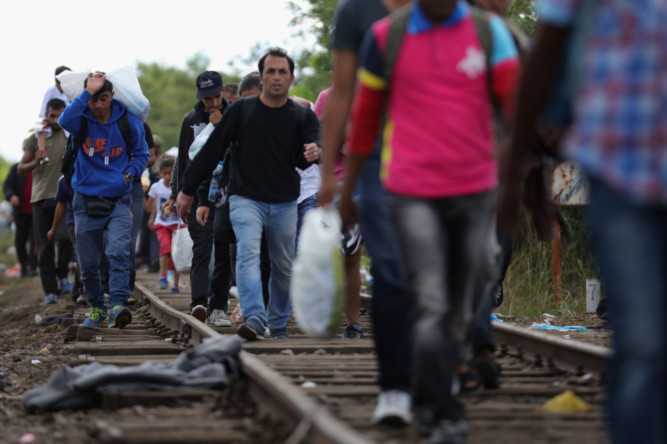Haian Dukhan was overwhelmed with sadness when he saw the heartbreaking picture of three-year-old Syrian refugee Aylan Kurdi washed up on a Turkish beach a few weeks ago.
It breaks his heart that more than 200,000 lives have been lost since the war in Syria started in 2011 and millions of ordinary people have been displaced.
But as a Syrian himself, he understands the desperation that drove the child’s family, and millions of other ordinary people, to leave their homes and seek a new life somewhere, anywhere, where they might be safe.
And he fears the situation is only going to get worse before it gets better.
Growing up in the ancient historical city of Palmyra, the 34-year-old had first-hand experience of President Bashar al-Assad’s regime which suppressed freedom of speech and bred resentment through the persistence of economic poverty.
When widespread discontent at similar economic hardship, autocratic rule and corruption toppled Tunisia’s President Zine al-Abidine Ben Ali in January 2011, Haian celebrated the dawn of the pro-democracy ‘Arab Spring’ and quietly welcomed the rebellion which began in the rural lands around his hometown.
Whilst the regime kept tribalism and sectarianism in check, anger had been boiling amongst the suppressed population for years and all that was needed was a “spark” to awaken the masses. At the same time he was scared, as he knew what brutality the Assad regime was capable of.
But since he left Syria in 2012 to study for his PhD at St Andrews University, millions of Haian’s own peace loving country-folk have found themselves caught between Assad’s rebel-crushing regime and the rise of ISIS which has brought in its own level of brutality.
In an interview with The Courier, he said:“It’s sad to see Syria, that country once so peaceful, that used to host refugees, now in this state. But people should know. These people are fleeing to escape death. They are the victims. The ordinary people who do not want to carry arms, who do not want to fight.”
It was the ISIS take-over of Palmyra earlier this year which resulted in his own family being forced out. The city was pummeled by government barrel bombs which have indiscriminately targeted schools, bakeries and markets.
In May, his family of “moderate Muslims” escaped with their lives after experiencing one of the fiercest battles between ISIS and the Syrian regime. They evacuated the family home one hour before it was bombed to rubble by the government. They then joined a caravan of refugees leaving Syria and managed to reach southern Turkey and are now trying to settle there.
With the help of St Andrews University staff and students who supported his online campaign, Haian has managed to raise £10,000 to support his father and mother (a schoolteacher), sister and two brothers, one of whom is married and has two young children.
Haian, a wheelchair user since childhood due to a physical disability, describes the opposing Syrian forces as “two evils”. But he said some Syrians had joined ISIS because they thought the international community was hypocritical.
He said: “Because the international community did nothing to stop Assad, basically those who have joined ISIS in Syria think the whole world is against them, because Assad has killed thousands of them, and the international community has done nothing to protect them.”
And yet life under ISIS was “suffocating”. He added:“I give you the example of my mother. “She was director of the school and a teacher for 30 years. She lived a life where she mixed with men. Suddenly she had to cover her face completely and wear gloves. Even going to the parks it was suddenly segregated. Then there are the beheadings, the murder
“My family don’t want to live under the dictatorship of Assad or ISIS control. Of course they love Syria, they miss home, they want to go home. But not under these conditions.”
Haian believes military intervention from western governments could have been useful in the early days of the uprising. But with the rise of ISIS, and the fighting of a “proxy“ regional war between the Russia/Iran-backed Assad regime on one side and the Saudi Arabia/Turkey-backed rebels on the other, he said it was now “complicated”. He said: “Who do you want to intervene against? If you intervene against the regime you are strengthening the factions. The best thing would be to push for a peaceful solution with Russia. There is no solution so long as Assad is in power. The Russians, rather than propping up Assad, need to be persuaded that he should be removed.
A transitional government should be created to fight ISIS. How can the people agree to live under a president who killed their children?”
Haian says Europe, particularly Germany, is doing well by taking in refugees. But he believes the international community should do more. He said vast countries like Russia, the USA, Canada and Australia should be doing their bit. The oil rich Arab nations, which have helped radicalise the conflict, should also assist, he said.
